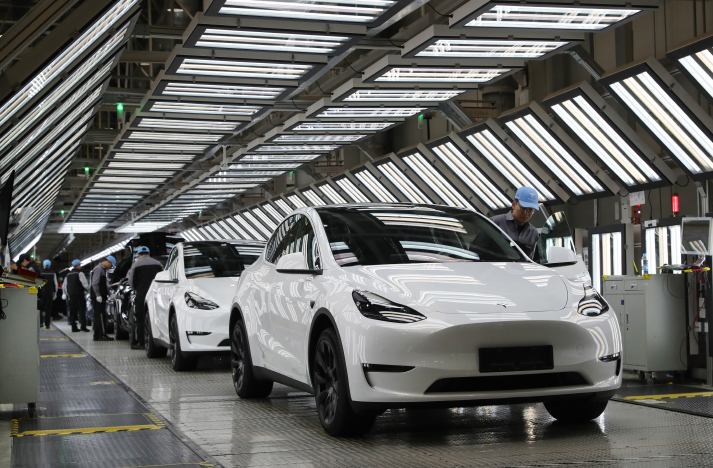A natural bridge
From:Beijing Review Date:2024-04-26【Font:large regular】

Michael Hart
As the world's two largest economies, China and the United States have deeply intertwined economic interests. Amid the evolving landscape of China-U.S. economic and trade ties, what are the U.S. business community's views on the Chinese market?
In an exclusive interview with Beijing Review reporter Zhang Shasha, Michael Hart, President of the American Chamber of Commerce in China (AmCham China), shared his perspectives on foreign investors' perceptions of the Chinese market, China's present and future opportunities for overseas businesses, as well as the pivotal role of China-U.S. economic and trade relations for both nations and the world at large. Edited excerpts of the interview follow:
Beijing Review: With many years of business experience in China, you have witnessed the changes in and developments of the Chinese market. What opportunities has the Chinese market provided for U.S. companies and investors?
Michael Hart: It has been almost 30 years that I've been in Greater China. China has changed a great deal during that time. Thirty years ago, many companies were just setting up operations here to manufacture and source goods. Over that time, China has become the leading place in the world for manufacturing. It has not just become a cheap location to produce but has also become a place that's well-known for cutting-edge, top-level manufacturing and sourcing.
China's place in the world has also changed. It has risen in terms of GDP, and now it is the second largest economy in the world. During these 30 years, the Chinese have become some of the world's largest consumers. The goods that Chinese consumers buy have also changed because China has become a country with many wealthy middle-class consumers. The country has sent people abroad as well. Every year, hundreds of thousands of Chinese students go overseas to study. China has really grown, prospered, and developed its own companies in many areas.
Many of the changes I've talked about were opportunities for U.S. companies, and so they have been coming to China for these 30 years. The majority of AmCham China member companies have found opportunities in China, whether it be to produce goods, source goods or increasingly sell goods to the Chinese market. This trend has continued as China has become more prosperous and wealthy.
In July 2023, U.S. Census Bureau data showed that China's share of U.S. goods imports fell to the lowest level since 2006. China's customs data also showed China's exports to the U.S. dropped by 13.1 percent in 2023. How do you view these changes?
What I would say is the nature of trade with China and China's trade with the world has also changed. One of the things that have happened is that because of the COVID-19 pandemic interruptions, people did look a little bit to diversify their supply chains. But China continues to be critical to many companies' supply chains. But also in that timeframe, Chinese manufacturers have started to go to other parts of the world. As supply chains have shifted, China continues to invest as well. So what you're starting to see is Chinese factories in places like Viet Nam, India and Mexico. As the flows of goods change, China continues to play a role in that.
So the statistics that have changed are not just because of U.S. actions, in some cases it is because the Chinese companies themselves have become more diversified. I start to hear a lot more about Chinese companies going out into the world and becoming multinational corporations themselves. I talked to someone who said that they were being recruited by a Chinese electric vehicle (EV) maker to take that brand overseas. And so there are a lot of reasons as to why the trade numbers have changed and why exports directly from China or imports directly into the U.S. have changed a little bit. It's a very complicated story.
How do the changes influence AmCham China members? When you're talking with heads of your member companies, what is currently their most common concern? Are there many of them planning to leave China?
AmCham China's goal is to help American companies succeed in China. So our member companies are here trying to find either a great place to produce or to source or to increasingly sell to the Chinese market. As all of these are major multinational companies,
they often talk about the need to be in China because China needs to be part of your overall global structure. As economies go up and down and as China's economy starts to slow a little bit, we'll see some adjustments, but China continues to be a major consumer market. China was initially a low-cost provider. As China becomes more expensive, as labor rates rise, some foreign companies who have been in China will start to slowly move their supply chains to other places, but Chinese companies themselves are doing the same thing. It is a very fascinating and interesting experience as these changes happen.
There are a couple of concerns U.S. companies have. One of them is around national treatment or access to sell in the China market. The Chinese Government, state-owned enterprises, schools and hospitals are very large consumers. So American companies want to be able to have the same access and to sell into those markets. For example, if a U.S. company is producing some of the world's best medical equipment, they want to be able to sell those into Chinese hospitals. And if they've set up factories in China to build them here, they certainly want to be treated equally with local companies in their ability to sell.
A year ago China made changes to its cross-border data rules about where data flows. Every sort of company, whether it be a retailer, a manufacturer or a financial services company, all have data that flow back and forth. That's part of their basic business practices. They want to comply with the law, but they're very concerned about making sure they understand China's new data rules and make sure that the cross-border data rules don't inhibit their business. So that's a pretty big concern as well.
Every year, when we do our business climate survey, we do ask companies, "Are you planning to leave China?" The vast majority of our companies say right now they're not planning to leave. There was a little increase in those who are looking for other opportunities. But the vast majority of companies right now say they're planning to be here for the long term. I think the key is whether they continue to get access. Does this continue to be a place where they can competitively work, compete and sell? One of things that's happened over the past 20 years, as well, is local Chinese companies have grown up to compete. And so now, foreign companies believe they have very good products and services and would like to sell them, but now have local competitors. One of the challenges during the COVID-19 period was that many companies, including Chinese companies, had their supply chains interrupted. And so everybody wants to make sure that their supply chains are a little bit more resilient, which might mean that you have one or two places that you add to make sure you can source from as well. But we don't see a huge move of people headed out the door.

Workers conduct inspections on vehicles at U.S. electric car maker Tesla's Gigafactory in Shanghai on December 22, 2023 (XINHUA)
Is the Chinese market still attractive to U.S. companies? In terms of industries, how have the sectors of interest for U.S. enterprises changed at different stages? Currently, what industries are U.S. companies most interested in?
Yes, the China market will continue to be attractive, I believe, for certainly the next couple of decades, as far as I can see. When we did our business climate survey this past year, we saw a huge increase from last year and optimism from companies that sell into the consumer market. We continue to hear that retail brands, whether they sell goods and services, continue to expand in China and see an opportunity here.
Innovation continues to make changes. For example, a number of auto companies have come to China and China now is a major player and competitor in EVs. It still doesn't change the fact that American companies want to be here and want to sell. People often do prefer to buy good quality products and many U.S. brands sell well. That continues as China has become wealthier and what it wants to buy has moved up the chain. For example, as China has continued to become wealthier, Chinese eat more meat, which means Chinese will buy more soybeans from the U.S. to feed their animals. So there are all kinds of benefits as China has become richer and has become a more sophisticated consumer.
Where we've heard the most news recently has certainly been in healthcare. With China's aging population, the demand for healthcare will increase. U.S. companies continue to have an advantage in drugs, special devices and other services related to aging and healthcare. The U.S. has high-quality products, and American companies want to sell them in the Chinese market.Certainly, China needs it because China continues to upgrade what [living standard] it expects for its own citizens. Healthcare is an obvious place, but in everything from airplanes to coffee, we think American products are of high quality, so we hope that they can all access this market.
What do you think of the current China-U.S. economic and trade relations? What significance does China-U.S. economic and trade cooperation hold for both nations and the world?
When we survey our members, they tell us the number one concern is U.S.-China relations. So if the U.S. and China are getting along, it makes it a lot easier for businesses to operate. And so that's a really important part for our members. Unlike rivals in the past, the U.S. and China are rivals in many ways but also have a very robust, complicated, intertwined trade relationship. So we need each other, we need to do business together. And so that's a complicated part of it. Of course, as technologies—everything from semiconductors to artificial intelligence (AI)—often are also considered national security issues, it makes it a complicated structure. So there are people on both sides who say we should trade with each other less. We have folks on both sides who say we should make everything at home. Those of us in the business community who study comparative advantage realize that the two countries have done well by trading together, and that would be my preference. AmCham China, in general, is for much freer trade. We like to have fewer restrictions. I understand the challenges about U.S.-China relations. But I also see the benefits that we've given each other by trading together.
I'm a big believer that business builds bridges. If we go back over the last three or four years where there wasn't much travel back and forth, the people who were traveling were almost exclusively business people. When there were some diplomatic disagreements in the U.S., and Chinese government officials weren't talking very much, business was talking to both sides. So business continued to happen, partially because we all need to eat and drink and we need certain products. But I think business continues to be a positive force and, again, focuses on everyone's comparative advantages in trying to find ways to cooperate. So business is a natural bridge. And it is a stabilizing force in our relationship.
The U.S. and China are the number one and number two largest economies in the world. And so when the U.S. does well, when China does well, other people feel that in their own economies. So it's important for our two economic engines to be firing well. Many people sell commodities to these two nations. Many people consume products produced by these two nations. The U.S. and China continuing to get along and bringing stability to the world will have a nice sort of peace dividend for everybody else in the world.

A staff member of U.S. technology company Apple Inc. welcomes the first batch of customers at Apple's new retail store in Jing'an District, Shanghai, on March 21 (COURTESY PHOTO)
In facilitating cooperation in the business domain between China and the U.S., what role has the chamber played and will it continue to play amid the changing landscape?
One of the things that AmCham China does is advocacy, and we want to help American companies succeed in China. Part of that is the regulatory environment. So companies try to sell things or try to produce things and they will sometimes run into questions about rules. So we organize meetings for them to meet Chinese officials and Chinese regulators to make sure that they can understand those policies. AmCham China tries to help both sides. If U.S. companies are successful here, that means they will be employing more Chinese folks. It means they'll be producing more good quality goods. So we want to see them succeed.
But we do play a role often that bridges over into politics. On March 1, we hosted our annual government appreciation dinner and we were very fortunate to have [Chinese] Vice President Han Zheng come and join us. And I think that was a really good statement about China's intention to try to engage with the U.S. We also had the U.S. ambassador there. So when I saw the two folks talking at our head table, it felt like we were certainly helping to bring folks together to be able to have reasonable discussions. And we're very pleased to play that role.
Looking ahead, what opportunities do you think China can continue to offer and what challenges do U.S. businesses still face when entering the Chinese market?
China will continue to see its economy grow and continue to diversify and innovate. Many of our companies say because they're global companies, they need to be operating around the world and China, in a number of areas, has continued to be innovative. Most recently we've seen it in EVs, but we've also seen it in other technologies like payment technologies and video streaming.
As China continues to innovate, it becomes an excellent location for companies to ensure they fully leverage all the innovations globally.



